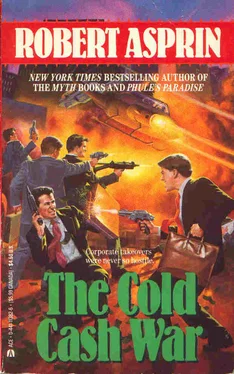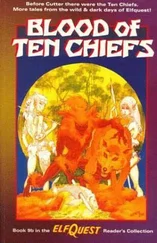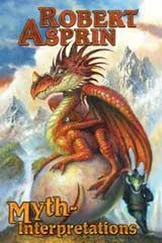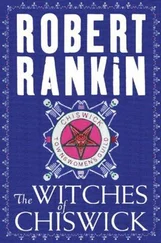Robert Asprin - The Cold Cash War
Здесь есть возможность читать онлайн «Robert Asprin - The Cold Cash War» весь текст электронной книги совершенно бесплатно (целиком полную версию без сокращений). В некоторых случаях можно слушать аудио, скачать через торрент в формате fb2 и присутствует краткое содержание. Жанр: Фантастика и фэнтези, на английском языке. Описание произведения, (предисловие) а так же отзывы посетителей доступны на портале библиотеки ЛибКат.
- Название:The Cold Cash War
- Автор:
- Жанр:
- Год:неизвестен
- ISBN:нет данных
- Рейтинг книги:3 / 5. Голосов: 1
-
Избранное:Добавить в избранное
- Отзывы:
-
Ваша оценка:
- 60
- 1
- 2
- 3
- 4
- 5
The Cold Cash War: краткое содержание, описание и аннотация
Предлагаем к чтению аннотацию, описание, краткое содержание или предисловие (зависит от того, что написал сам автор книги «The Cold Cash War»). Если вы не нашли необходимую информацию о книге — напишите в комментариях, мы постараемся отыскать её.
The Cold Cash War — читать онлайн бесплатно полную книгу (весь текст) целиком
Ниже представлен текст книги, разбитый по страницам. Система сохранения места последней прочитанной страницы, позволяет с удобством читать онлайн бесплатно книгу «The Cold Cash War», без необходимости каждый раз заново искать на чём Вы остановились. Поставьте закладку, и сможете в любой момент перейти на страницу, на которой закончили чтение.
Интервал:
Закладка:
He interrupted the display to reference an information request from the U.S. government that had gone unanswered for more than a month. They were asking for any and all information about the terrorist group, and offering a price that was well beyond tempting. Nobody answered.
The closest anyone had come to catching a member was one nut with a bomb. Although he swore up and down he was a member of that mystical group, investigation discovered he was working alone with a bomb he had built in his basement. Even the newspapers conceded he was probably a loner who was trying to cash in on the international publicity generated by the hunt for the elusive assassins.
Nobody could get a solid lead no matter what price was offered. That was what gave Mausier his first clue. There was only one time before he had known of when all levels of information hunters, governmental and free lance, had come up empty-handed. That was the aftermath of the Russo-Chinese War, when the C-Block sealed itself up and began buying but never selling information. The only possible explanation was the terrorist group was a front manned by and covered for by the C-Block. After all, wasn't it their inquiries that initially alerted him to the tie-in between the nine-no, eight-corporations?
But there his logic fell apart. Why were they doing it? To infiltrate the corporate structure with their own people? If so, why did they request personnel listings? Wouldn't they know who they were sending in?
He put it out of his mind for the moment and keyed for another display. Japan. During the time period in question, there had only been one death in the Japanese companies under surveillance, and that was of old age.
An article from a martial arts magazine eulogized the passing of an old sensei who had retired from teaching to take over some obscure physical fitness program for Japanese industry. That couldn't possibly tie in with the other items-or could it?
Mausier wished for a moment that someone would put in a request for the coroner's report on the old man's death so he could see if it was actually available, but he shrugged it off as wishful thinking. It never occurred to him to request the information himself. That would be cheating! He'd work with the pieces as they were given to him.
Why had Japan escaped the notice of the assassins? In fact, from watching the information requests, they seemed to have escaped the notice of the other eight corporations. The only one requesting information on them was the C-Block. Were they unrelated to the puzzle, or were they in fact the people behind the assassins?
Mausier shook his head in bewilderment and keyed for another display. An article flashed on the screen. It was an account of the death of a corporate executive, Edward Bush, at the hands of one of the terrorist assassins. This held particular interest for Mausier, as Bush had been one of his clients.
According to the article, the incident had not been unlike a score of others. A long-range sniper working in broad daylight picked him off on the sidewalk in front of his office and escaped without a clue.
The pattern was so repetitious Mausier could almost sing it in his sleep.
He was willing to accept it as an unfortunate coincidence. Bush had been a buying, not a selling client, so it was unlikely that his death was linked in any way to his dealings with Mausier. Still, there was something afoot.
Bush's own corporation had submitted an information request for details surrounding his death. What made it strange was that they had not made any similar requests regarding any of their other executives killed by snipers. Bush had not been particularly high-ranked in the corporation. Why the sudden interest in his demise?
There was still another curious coincidence connected with Bush's death. The C-Block was also requesting details. They hadn't requested details on any of the corporate deaths until now. Clearly there was something strange about the killing, but what? Was it Bush or the manner of his death? If Mausier's theory about the C-Block team of assassins was correct, would they know all about the incident already? Maybe it was the Japanese after all. Those damn Japanese! Where did they fit into it all? Did they fit in at all?
Mausier suddenly became aware of sounds in the outer office and realized his employees were arriving. He hastily turned off his doodlescreen and began composing himself for the day's routine.
As he did, however, he made a mental note to himself. He was going to go out at noon. For years he had seesawed back and forth trying to weigh necessity against childish romanticizing, but now he had made up his mind. He was going to buy a gun. Whatever was going on, the game was being played for high stakes and he was sitting on too much information to ignore the potential danger in his position.
13
The cliff was as foreboding as ever; the straw dummies waited passively at the base. Still, Tidwell realized his interest was at a peak as he sat waiting with Clancy for the next group to appear. The two mercenaries were perched on the lip of the cliff, dangling their legs idly, about five meters to the left of the trail.
They came, five of them darting silently from tree to tree like spirits. As they approached the cliff, the leader, a swarthy man in his thirties, held up his hand in a signal. The group froze, and he signaled one of the team forward. Tidwell smiled as a girl in her mid-twenties slung her rifle and dropped to her stomach, sliding forward to peer over the cliff. The leader knew damn well what was down there because he had run the course hundreds of times before, but he was playing it by the book and officially it was a new situation to be scouted.
The girl completed her survey, then slid backward for several meters before she rose to a half-crouch. Her hands flashed in a quick series of signals to the leader. Clancy nudged Tidwell, who smiled again, this time from flattered pleasure. Since he had taken over, the entire force had begun using his habit of sign language. It was a high compliment. The only trouble was that they had become proficient with it and had elaborated on his basic vocabulary to a point where he now sometimes had trouble following the signals as they flashed back and forth.
The leader made his decision. With a few abrupt gestures from him, the other three of the team, two men and a woman, slung their rifles and darted forward, diving full-speed off the cliff to confront their luckless "victims" below. The leader and the scout remained topside.
The two observing mercenaries straightened unconsciously. This was something new. The leader apparently had a new trick up his sleeve.
As his teammates sprinted forward, the leader reached over his shoulder and fished a coil of rope out of his pack. It was a black, lightweight silk line, with heavy knots tied in it every two feet for climbing. He located and grasped one end, tossing the coil to the scout. She caught it and flipped it over the cliff, while the leader secured his end around a small tree with a quick-release knot. This done, he faded back along the trail about ten meters to cover the rear, while the scout unslung her rifle and eased up to the edge of the cliff ready to cover her teammates below.
Clancy punched Tidwell's shoulder delightedly and flashed him a thumbs-up signal. Tidwell nodded in agreement. It was a sweet move. Now the three attackers below had an easy, secure route back out as well as cover fire if anything went wrong.
Tidwell felt like crowing. The reorganization of the force was working better than he would have dared hope. The whole thing had been a ridiculously simple three-step process. First, there had been a questionnaire asking eight questions: Which four people in the force would you most like to team with? Why? Who would you be least willing to team with? Why? Who would you be most willing to follow as a leader? Why? Who would you be least willing to follow as a leader? Why?
Читать дальшеИнтервал:
Закладка:
Похожие книги на «The Cold Cash War»
Представляем Вашему вниманию похожие книги на «The Cold Cash War» списком для выбора. Мы отобрали схожую по названию и смыслу литературу в надежде предоставить читателям больше вариантов отыскать новые, интересные, ещё непрочитанные произведения.
Обсуждение, отзывы о книге «The Cold Cash War» и просто собственные мнения читателей. Оставьте ваши комментарии, напишите, что Вы думаете о произведении, его смысле или главных героях. Укажите что конкретно понравилось, а что нет, и почему Вы так считаете.









